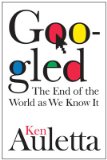Historians writing about events that have faded into a distant memory are challenged by the need to accurately portray these events and to provide analysis and commentary that sheds light on what happened and why. In contrast, writers covering current events where the end of a story is not yet known face a much more difficult task. Their interpretation of events may prove to be inaccurate or embarrassing in the not-so-distant future particularly when dealing with a subject related to technology.
Ken Auletta is apparently a brave author given his willingness to write about a story where the ending is still very much unfinished in Googled: The End of the World as We Know It. Mr. Auletta provides a great deal of insight regarding Larry Page and Sergey Brin, Google’s founders, along with a good description of Google’s meteoric rise over the past decade. However, the more interesting aspect of the narrative involves the forward looking insights provided by Mr. Auletta and many technology leaders who are quoted extensively throughout the book.
While the book is of particular interest to those seeking more color regarding the entrepreneurial story behind Google and its rapid rise, I found myself drawn to the clear implications for the newspaper industry as well as lessons that investors should learn based on Google’s story. For a review covering other details of the book, The Wall Street Journal published an interesting article earlier this month.
The Decline of Newspapers
Of all the issues facing society today, few come close to the importance of the decline of newspapers and journalism. This may seem like an outrageous claim given the state of the economy, high rates of unemployment, and the range of other problems facing the country. However, without top notch journalism, how will citizens be informed about these issues or hold government accountable?
One statistic from the book jumped off the page:
A regular reader of the New York Times spends thirty-five minutes each day with the print version, according to Nielsen, while those who read the Times online spend only thirty-seven minutes a month reading it. These figures can be misleading, because they average in the occasional visitors who may spend a minute or less online with those who are online devotees. Nevertheless, there is a wide disparity between online and print newspaper readers. Pages 165-166
Thirty-five minutes per day versus thirty-seven minutes per month! What could account for this disparity? The online reader may be treating journalism as a “buffet” and browsing multiple sites for information rather than spending time exclusively with one paper. However, the typical online reader may simply be missing a great deal of information compared to the print reader. The online reader’s knowledge may end up being a mile wide and an inch deep as a result.
One factor that is seldom discussed is the fact that a physical newspaper, by virtue of its format and physical qualities, encourages readers to take in a broader variety of content than the typical online reader who searches for a topic (usually via Google) and is taken directly to the relevant article. Often when reading a physical paper, one notices nearby articles that seem compelling enough to read but are not subjects that the reader would directly search for. Some online sites are better than others in terms of suggesting related content, but none that I have seen come close to the physical properties of the printed newspaper.
From an economic standpoint, the book goes into quite a bit of detail regarding the loss of advertising that many papers have suffered and the fact that few papers have been able to charge for content. While Google has played a role in this trend, it is by no means a situation that was caused by Google. Readers have simply been conditioned to expect free information online and will hesitate to pay for access. The drama associated with this dilemma escalated today when Rupert Murdoch’s News Corp. was reported to be in talks with Microsoft regarding a partnership that could result in News Corp’s newspaper content being removed from Google sites.
Creative Destruction and The Intelligent Investor
In the 1980s, who would have thought that the typical city newspaper was anything other than a wonderful monopoly-like business with a powerful economic moat? As a teenager delivering and selling papers in the 1980s in the Silicon Valley, the question I faced was not whether a household subscribed, but whether they took the morning or evening edition, or if they favored the San Francisco Chronicle or the San Jose Mercury News. Nearly every house had some type of newsprint on their driveway each day.
The newspaper industry is just one of many that have been impacted by the Internet in general and Google in particular. Ad agencies, traditional broadcasters, and many other media companies have seen their economic models damaged severely. Furthermore, few of these businesses twenty years ago could have forecast the economic earthquake to come. Many if not most of these businesses would have appeared to have strong economic moats in place.
Ignoring Google’s rise over the past decade would have been a recipe for creating blind spots when it comes to evaluating the strength of existing moats. Investors need to constantly monitor their holdings and always consider whether it is possible for their business interests to be “Googled”. Anyone who believes that it is possible to simply say “I don’t deal with technology” may avoid losing money in technology investments but get blindsided by the impact of technology in unexpected ways.
Avoid being “Googled” by learning the lessons of this book and applying the insights when evaluating the moats of businesses in your own portfolio.
Disclosures: None.

